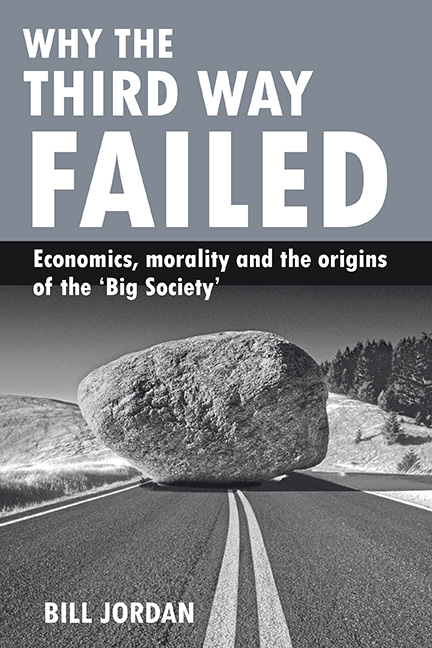seven - Sharing wealth, income and work
Published online by Cambridge University Press: 01 September 2022
Summary
If the Third Way's failure has ultimately been a moral one, and the evidence of this lies in its incoherence in the face of the global economic crash, what might be a morally persuasive policy response to this new situation? In the final part of this book I turn from analysing the shortcomings of the Third Way to proposing alternative approaches.
The ideas to be discussed in this and the next two chapters are a mixture of general principles which have been around for many years, and whose moment may finally have come in the present crisis, and specific proposals by politicians and think-tanks, which recommend immediate steps to address current issues. In this chapter I aim to show how a set of recommendations for reorientating the tax-benefit system, in order to correct specific failures and unintended consequences, might be a first step towards a long-term shift in the way public institutions shape the distribution of wealth, income and work, as well as deploy state power in relation to citizens.
Interviewed in the New Statesman magazine on 29 October 2009, the controversial and high-profile Slovenian philosopher Slavoj Žižek talked about the response to the crash as follows:
The only serious, true serious, proposal that we know about is on the one hand this Krugman-Stiglitz leftist Keynesianism, and on the other this idea, popularised in Europe and Latin America, of basic income. I like it as an idea, but I think it's too much of an ideological utopia. For structural reasons, it can't work. It's the last desperate attempt to make capitalism work for socialist ends. The guy who developed it, Robert [he meant Philippe] Van Parijs, openly says that it is the only way to legitimise capitalism. Apart from these two, I don't see anything else. (Žižek, 2009a)
In the first two parts of this book I argued that the Keynesian response to the crisis has been a desperate attempt at damage limitation, by both neo-liberal governments (for example, George W. Bush's administration in the US) and Third Way and Christian Democratic ones in Europe and the other affluent countries. I therefore propose to focus on the second proposal, a basic (or citizen’s) income – the idea that each individual person should be entitled to an unconditional income, without means test or work requirement.
- Type
- Chapter
- Information
- Why the Third Way FailedEconomics, Morality and the Origins of the 'Big Society', pp. 151 - 170Publisher: Bristol University PressPrint publication year: 2010



